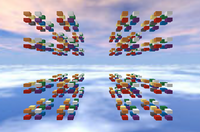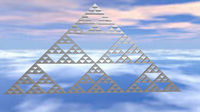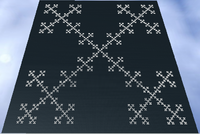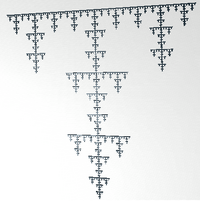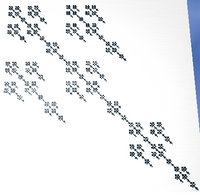Fractals: Difference between revisions
>Mindraker No edit summary |
>Mindraker No edit summary |
(No difference)
| |
Revision as of 11:55, 18 December 2008
Sierpinsky Triangle
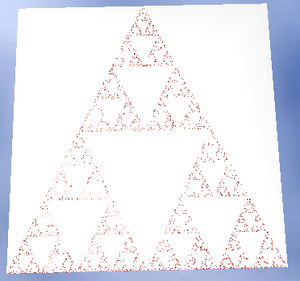
x = 0
y = 1.8
z = 0
for i = 1, 4000 do
a = math.random(1,3)
if a == 1 then
x = x / 2
z = (z - 250)/2
end
if a == 2 then
x = (x - 250)/2
z = (z + 250)/2
end
if a == 3 then
x = (x + 250)/2
z = (z + 250)/2
end
p = Instance.new("Part")
p.CFrame = CFrame.new(Vector3.new(x,1.8,z))
p.Size = Vector3.new(1,1,1)
p.Anchored = true
p.Color = Color3.new(1)
p.Parent = game.Workspace
--wait(.1)
end
3D Sierpinsky Triangle
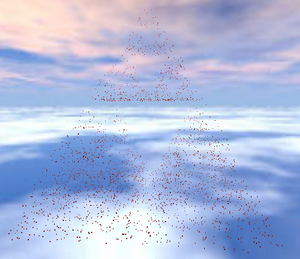
WARNING This can freeze up your computer. (My computer could only handle 5000 after about a half hour.) If you have a slow computer, reduce the "For" loop to a lower number, like 500, then work your way up to 1000.
For a better picture of what this is, see the wikipedia article on Sierpinsky triangles
local x = 0
local y = 1.8
local z = 0
for i = 1, 5000 do
a = math.random(1,8)
if a == 1 then
x = (x - 200)/2
y = (y - 200)/2
z = (z + 200)/2
end
if a == 2 then
x = (x + 200)/2
y = (y - 200)/2
z = (z + 200)/2
end
if a == 3 then
x = (x - 200)/2
y = (y - 200)/2
z = (z - 200)/2
end
if a == 4 then
x = (x + 200)/2
y = (y - 200)/2
z = (z - 200)/2
end
if a == 5 then
x = (x + 0)/2
y = (y + 200)/2
z = (z + 0)/2
end
p = Instance.new("Part")
p.CFrame = CFrame.new(Vector3.new(x,y,z))
p.Size = Vector3.new(1,1,1)
p.Anchored = true
p.Color = Color3.new(1)
p.Parent = game.Workspace
--wait(.1)
end
Sierpinksy
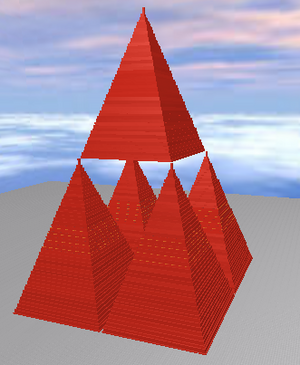
This won't make a mathematical recreation of the Sierpinksy fractal, but it will merely make a pretty visual representation of it.
x=1
y=1
for i = 50, 1, -1 do
x=i
y=(50-i)
z=(50-i)
p = Instance.new("Part")
p.CFrame = CFrame.new(Vector3.new(1,i,1))
p.Size = Vector3.new(y,x,z)
p.Anchored = true
p.Color = Color3.new(1)
p.Parent = game.Workspace
--wait(1)
end
for i = 50, 1, -1 do
x=i
y=(50-i)
z=(50-i)
p = Instance.new("Part")
p.CFrame = CFrame.new(Vector3.new(1+50,i,1+50))
p.Size = Vector3.new(y,x,z)
p.Anchored = true
p.Color = Color3.new(1)
p.Parent = game.Workspace
--wait(1)
end
for i = 50, 1, -1 do
x=i
y=(50-i)
z=(50-i)
p = Instance.new("Part")
p.CFrame = CFrame.new(Vector3.new(1+50,i,1))
p.Size = Vector3.new(y,x,z)
p.Anchored = true
p.Color = Color3.new(1)
p.Parent = game.Workspace
--wait(1)
end
for i = 50, 1, -1 do
x=i
y=(50-i)
z=(50-i)
p = Instance.new("Part")
p.CFrame = CFrame.new(Vector3.new(1,i,1+50))
p.Size = Vector3.new(y,x,z)
p.Anchored = true
p.Color = Color3.new(1)
p.Parent = game.Workspace
--wait(1)
end
for i = 50, 1, -1 do
x=i
y=(50-i)
z=(50-i)
p = Instance.new("Part")
p.CFrame = CFrame.new(Vector3.new(1+25,i+75,1+25))
p.Size = Vector3.new(y,x,z)
p.Anchored = true
p.Color = Color3.new(1)
p.Parent = game.Workspace
--wait(1)
end
Fern leaf
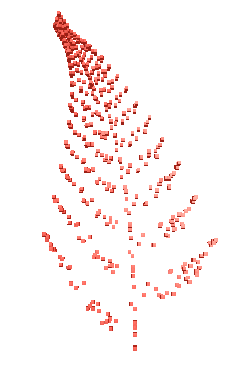
x = 1
y = 1.8
z = 1
for i = 1, 500 do
a = math.random(1,100)
if a == 1 then
x = 0
z = (0.16*z)
elseif a > 1 and a <= 8 then
x = ((0.20*x) - (0.26*z))
z= (0.23*x + 0.22*z + 16)
elseif a > 8 and a <= 15 then
x = ((-0.15*x) + 0.28*z)
z = (0.26*x + 0.24*z + 4.4)
elseif a > 15 and a <= 100 then
x = 0.85*x + 0.04*z
z = ((-0.04*x) + 0.85*z + 16)
end
p = Instance.new("Part")
p.CFrame = CFrame.new(Vector3.new(x,1.8,z))
p.Size = Vector3.new(1,1,1)
p.Anchored = true
p.Color = Color3.new(1)
p.Parent = game.Workspace
wait(.1)
end
Mandelbrot set
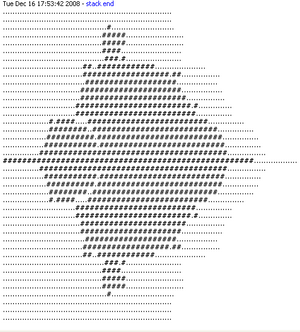
This image requires the Output window of Roblox studio. Thanks to Serveringhaus.org for this code.
iter=100
esclim=2.0
ulx=-2.0
uly=1.0
lrx=1.0
lry=-1.0
width=70
height=40
function abs(x,y)
return math.sqrt(x*x+y*y)
end
function escapeq(cx,cy)
local zx=0.0
local zy=0.0
local i=0
while i<iter and abs(zx,zy)<esclim do
tmp=zx*zx-zy*zy
zy=2.0*zx*zy
zx=tmp
zx=zx+cx
zy=zy+cy
i=i+1
end
return i<iter
end
for y=1,height do
line=''
for x=1,width do
zx=ulx+(lrx-ulx)/width*x;
zy=uly+(lry-uly)/height*y;
if escapeq(zx,zy) then
line=line..'.'
else
line=line..'#'
end
end
print(line);
end
Mandelbrot Brick Set
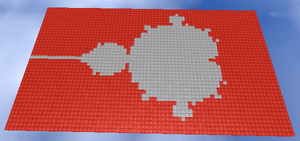
This is almost identical to the script above, but it uses bricks instead of the Output menu.
iter=100
esclim=2.0
ulx=-2.0
uly=1.0
lrx=1.0
lry=-1.0
width=70
height=40
function abs(x,y)
return math.sqrt(x*x+y*y)
end
function escapeq(cx,cy)
local zx=0.0
local zy=0.0
local i=0
while i<iter and abs(zx,zy)<esclim do
tmp=zx*zx-zy*zy
zy=2.0*zx*zy
zx=tmp
zx=zx+cx
zy=zy+cy
i=i+1
end
return i<iter
end
for y=1,height do
for x=1,width do
zx=ulx+(lrx-ulx)/width*x;
zy=uly+(lry-uly)/height*y;
if escapeq(zx,zy) then
p = Instance.new("Part")
p.CFrame = CFrame.new(Vector3.new(x,1.8,y))
p.Size = Vector3.new(1,1,1)
p.Anchored = true
p.Color = Color3.new(1)
p.Parent = game.Workspace
--wait(.1)
else
p = Instance.new("Part")
p.CFrame = CFrame.new(Vector3.new(x,1.8,y))
p.Size = Vector3.new(1,1,1)
p.Anchored = true
--p.Color = Color3.new(2)
p.Parent = game.Workspace
--wait(.1)
end
end
end
Cantor set
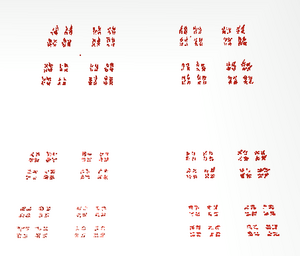
x = 0
y = 1.8
z = 0
for i = 1, 3000 do
a = math.random(1,4)
if a == 1 then
x = (x - 250)/3
z = (z - 250)/3
end
if a == 2 then
x = (x - 250)/3
z = (z + 250)/3
end
if a == 3 then
x = (x + 250)/3
z = (z + 250)/3
end
if a == 4 then
x = (x + 250)/3
z = (z - 250)/3
end
p = Instance.new("Part")
p.CFrame = CFrame.new(Vector3.new(x,1.8,z))
p.Size = Vector3.new(1,1,1)
p.Anchored = true
p.Color = Color3.new(1)
p.Parent = game.Workspace
--wait(.1)
end
3D Cantor set
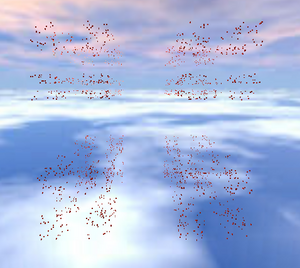
WARNING This can freeze up your computer. If you have a slow computer, reduce the "For" loop to a lower number, like 500, then work your way up to 1000.
local x = 0
local y = 1.8
local z = 0
for i = 1, 2000 do
a = math.random(1,8)
if a == 1 then
x = (x - 250)/3
y = (y - 250)/3
z = (z - 250)/3
end
if a == 2 then
x = (x - 250)/3
y = (y - 250)/3
z = (z + 250)/3
end
if a == 3 then
x = (x - 250)/3
y = (y + 250)/3
z = (z - 250)/3
end
if a == 4 then
x = (x - 250)/3
y = (y + 250)/3
z = (z + 250)/3
end
if a == 5 then
x = (x + 250)/3
y = (y + 250)/3
z = (z + 250)/3
end
if a == 6 then
x = (x + 250)/3
y = (y - 250)/3
z = (z + 250)/3
end
if a == 7 then
x = (x + 250)/3
y = (y + 250)/3
z = (z - 250)/3
end
if a == 8 then
x = (x + 250)/3
y = (y - 250)/3
z = (z - 250)/3
end
p = Instance.new("Part")
p.CFrame = CFrame.new(Vector3.new(x,y,z))
p.Size = Vector3.new(1,1,1)
p.Anchored = true
p.Color = Color3.new(1)
p.Parent = game.Workspace
--wait(.1)
end
3D Cantor set 2
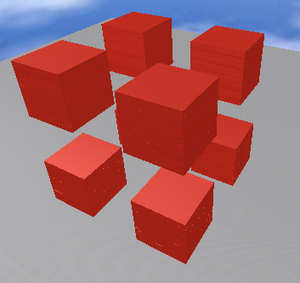
This is a proportional representation of the 3D Cantor set.
p = Instance.new("Part")
p.CFrame = CFrame.new(Vector3.new(1,17,1))
p.Size = Vector3.new(33,33,33)
p.Anchored = true
p.Color = Color3.new(1)
p.Parent = game.Workspace
p = Instance.new("Part")
p.CFrame = CFrame.new(Vector3.new(1+66,17,1+66))
p.Size = Vector3.new(33,33,33)
p.Anchored = true
p.Color = Color3.new(1)
p.Parent = game.Workspace
p = Instance.new("Part")
p.CFrame = CFrame.new(Vector3.new(1+66,17,1))
p.Size = Vector3.new(33,33,33)
p.Anchored = true
p.Color = Color3.new(1)
p.Parent = game.Workspace
p = Instance.new("Part")
p.CFrame = CFrame.new(Vector3.new(1,17,1+66))
p.Size = Vector3.new(33,33,33)
p.Anchored = true
p.Color = Color3.new(1)
p.Parent = game.Workspace
p = Instance.new("Part")
p.CFrame = CFrame.new(Vector3.new(1+66,17+66,1+66))
p.Size = Vector3.new(33,33,33)
p.Anchored = true
p.Color = Color3.new(1)
p.Parent = game.Workspace
p = Instance.new("Part")
p.CFrame = CFrame.new(Vector3.new(1,17+66,1+66))
p.Size = Vector3.new(33,33,33)
p.Anchored = true
p.Color = Color3.new(1)
p.Parent = game.Workspace
p = Instance.new("Part")
p.CFrame = CFrame.new(Vector3.new(1+66,17+66,1))
p.Size = Vector3.new(33,33,33)
p.Anchored = true
p.Color = Color3.new(1)
p.Parent = game.Workspace
p = Instance.new("Part")
p.CFrame = CFrame.new(Vector3.new(1,17+66,1))
p.Size = Vector3.new(33,33,33)
p.Anchored = true
p.Color = Color3.new(1)
p.Parent = game.Workspace
Untitled
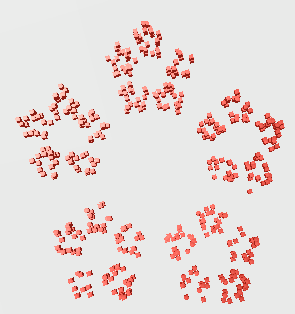
x = 68
y = 1.8
z = 56
for i = 1, 500 do
a = math.random(1,5)
if a == 1 then
x = x / 3
z = (z - 57)/3
end
if a == 2 then
x = (x + 68)/3
z = (z - 13)/3
end
if a == 3 then
x = (x + 42)/3
z = (z + 58)/3
end
if a == 4 then
x = (x - 42)/3
z = (z + 58)/3
end
if a == 5 then
x = (x - 68)/3
z = (z - 13)/3
end
p = Instance.new("Part")
p.CFrame = CFrame.new(Vector3.new(x,1.8,z))
p.Size = Vector3.new(1,1,1)
p.Anchored = true
p.Color = Color3.new(1)
p.Parent = game.Workspace
--wait(.1)
end
Untitled2
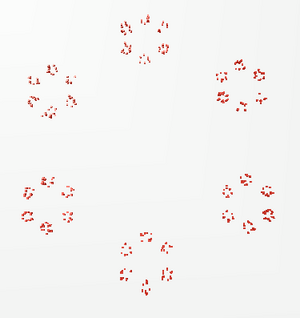
x = 82
y = 1.8
z = 30
for i = 1, 500 do
a = math.random(1,6)
if a == 1 then
x = (x - 185)/5
z = (z - 300)/5
end
if a == 2 then
x = (x + 180)/5
z = (z - 300)/5
end
if a == 3 then
x = (x + 345)/5
z = (z + 5)/5
end
if a == 4 then
x = (x + 175)/5
z = (z + 300)/5
end
if a == 5 then
x = (x - 180)/5
z = (z + 300)/5
end
if a == 6 then
x = (x - 350)/5
z = (z + 5)/5
end
p = Instance.new("Part")
p.CFrame = CFrame.new(Vector3.new(x,1.8,z))
p.Size = Vector3.new(1,1,1)
p.Anchored = true
p.Color = Color3.new(1)
p.Parent = game.Workspace
--wait(.1)
end
Quadratic Koch, 2nd iteration
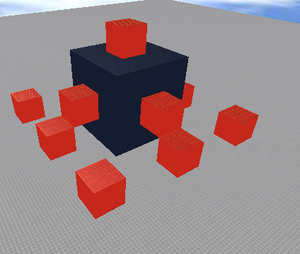
This doesn't get into the math behind it. See wikipedia for more info.
p = Instance.new("Part")
p.CFrame = CFrame.new(Vector3.new(1,16.2,0))
p.Size = Vector3.new(30,30,30)
p.Anchored = true
p.Color = Color3.new(0)
p.formFactor = "Symmetric"
p.Parent = game.Workspace
p = Instance.new("Part")
p.CFrame = CFrame.new(Vector3.new(0,21,0))
p.Size = Vector3.new(10,10,10)
p.Anchored = true
p.Color = Color3.new(1)
p.Parent = game.Workspace
p.formFactor = "Symmetric"
p = Instance.new("Part")
p.CFrame = CFrame.new(Vector3.new(0,16.2,20))
p.Size = Vector3.new(10,10,10)
p.Anchored = true
p.Color = Color3.new(1)
p.Parent = game.Workspace
p.formFactor = "Symmetric"
p = Instance.new("Part")
p.CFrame = CFrame.new(Vector3.new(21,16.2,0))
p.Size = Vector3.new(10,10,10)
p.Anchored = true
p.Color = Color3.new(1)
p.Parent = game.Workspace
p.formFactor = "Symmetric"
p = Instance.new("Part")
p.CFrame = CFrame.new(Vector3.new(-19,16.2,0))
p.Size = Vector3.new(10,10,10)
p.Anchored = true
p.Color = Color3.new(1)
p.Parent = game.Workspace
p.formFactor = "Symmetric"
p = Instance.new("Part")
p.CFrame = CFrame.new(Vector3.new(0,16.2,-20))
p.Size = Vector3.new(10,10,10)
p.Anchored = true
p.Color = Color3.new(1)
p.Parent = game.Workspace
p.formFactor = "Symmetric"
p = Instance.new("Part")
p.CFrame = CFrame.new(Vector3.new(0,6.2,30))
p.Size = Vector3.new(10,10,10)
p.Anchored = true
p.Color = Color3.new(1)
p.Parent = game.Workspace
p.formFactor = "Symmetric"
p = Instance.new("Part")
p.CFrame = CFrame.new(Vector3.new(-29, 6.2, 0))
p.Size = Vector3.new(10,10,10)
p.Anchored = true
p.Color = Color3.new(1)
p.Parent = game.Workspace
p.formFactor = "Symmetric"
p = Instance.new("Part")
p.CFrame = CFrame.new(Vector3.new(0, 6.2, -30))
p.Size = Vector3.new(10,10,10)
p.Anchored = true
p.Color = Color3.new(1)
p.Parent = game.Workspace
p.formFactor = "Symmetric"
p = Instance.new("Part")
p.CFrame = CFrame.new(Vector3.new(31, 6.2, 0))
p.Size = Vector3.new(10,10,10)
p.Anchored = true
p.Color = Color3.new(1)
p.Parent = game.Workspace
p.formFactor = "Symmetric"
p = Instance.new("Part")
p.CFrame = CFrame.new(Vector3.new(31, 6.2, -30))
p.Size = Vector3.new(10,10,10)
p.Anchored = true
p.Color = Color3.new(1)
p.Parent = game.Workspace
p.formFactor = "Symmetric"
p = Instance.new("Part")
p.CFrame = CFrame.new(Vector3.new(-30, 6.2, -30))
p.Size = Vector3.new(10,10,10)
p.Anchored = true
p.Color = Color3.new(1)
p.Parent = game.Workspace
p.formFactor = "Symmetric"
p = Instance.new("Part")
p.CFrame = CFrame.new(Vector3.new(-29, 6.2, 30))
p.Size = Vector3.new(10,10,10)
p.Anchored = true
p.Color = Color3.new(1)
p.Parent = game.Workspace
p.formFactor = "Symmetric"
p = Instance.new("Part")
p.CFrame = CFrame.new(Vector3.new(30, 6.2, 30))
p.Size = Vector3.new(10,10,10)
p.Anchored = true
p.Color = Color3.new(1)
p.Parent = game.Workspace
p.formFactor = "Symmetric"
Other Roblox Fractal images
See Also
Beauty in Mathematics, an introductory article on fractals with helpful images
